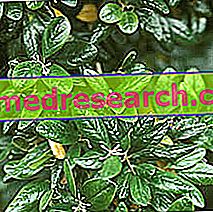
Scientific name
Peumus boldusFamily
MonimiaceaeOrigin
Spontaneous exclusively in Chile, boldo is grown in temperate and warm areas.Used Parts
Drug given by dried leaves.Chemical constituents
- Isoquinoline alkaloids (boldin);
- Flavonoids (isoramnetina);
- Essential oil rich in monoterpenes (limonene, p-cymene, 1, 8-cineol, fellandrene and ascaridol: a neurotoxic substance).
Boldo in Herbalist: Property of Boldo
Boldo has hepatoprotective, diuretic, stomachic, choleretic (flavonoids and alkaloids) and cholagogue properties.
Boldo uses titrated and standardized extracts in active ingredients (recommended intake of 1 mg of boldin per dose) obtained from the leaves.
Boldo is present in the Official Pharmacopoeia and in numerous medicinal specialties.
Biological activities
As mentioned, the boldo has several properties, among which the antispasmodic ones exerted at the level of the gastrointestinal tract, the cholagogue and choleretic ones and the stomachic ones.
These activities have been confirmed by several clinical studies conducted on the subject and are attributable to the alkaloids contained in the plant, especially to boldin.
For these reasons, boldo has obtained official approval for the treatment of digestive disorders.
Boldo against dyspeptic disorders
Thanks to the ability of the alkaloids contained in the boldo to increase the secretion of gastric juices and to promote the production of bile, this plant constitutes a valid remedy in the treatment of dyspeptic disorders and the symptoms associated with them (such as feeling of fullness, flatulence, etc. ).
To treat the aforementioned disorders, boldo can be taken in the form of titrated and standardized extracts in boldin.
Generally, we recommend taking a quantity of product equal to 1 mg of boldina, from two to three times a day. Alternatively, boldo can be taken as an infusion.
However, for more information about the uses of boldo in the treatment of digestive disorders, we recommend reading the dedicated articles "Taking care of Boldo" and "Boldo in Tisane".
Boldo in folk medicine and homeopathy
The digestive properties of boldo are also known to folk medicine, which uses this plant to counter dyspeptic disorders, but not only. In fact, traditional medicine uses boldo as a diuretic, hepatoprotective, cholagogue and anthelmintic remedy.
Boldo is also used in homeopathic medicine, where it can be found in the form of granules or mother tinctures. In this context the plant is used in case of digestive disorders, nausea and vomiting.
The amount of homeopathic remedy to be taken can be different between one individual and another, also depending on the type of disorder that needs to be treated and according to the type of preparation and homeopathic dilution that you want to use.
Contraindications
Boldo is a safe drug; however, care must be taken in patients suffering from cholestasis or calculosis of the biliary tract (gallbladder or common bile duct), neuropathies and epilepsy (essential oil) or hypersensitivity to one or more components. Furthermore, prolonged use is not recommended.
Pharmacological Interactions
- Anthraquinone laxatives with enhancement of the side effects of anthraquinones.



